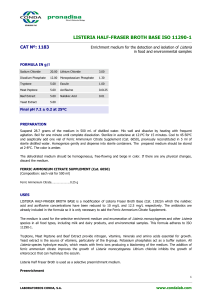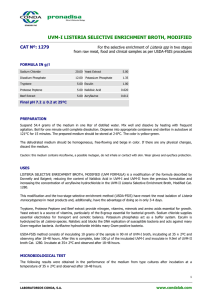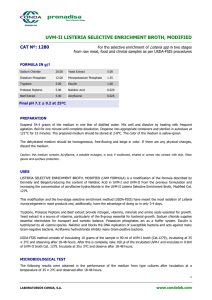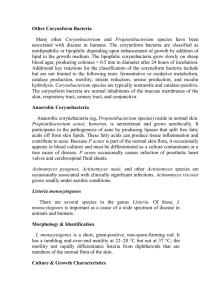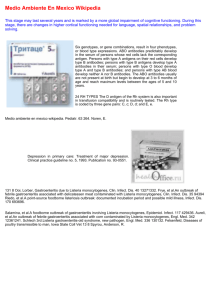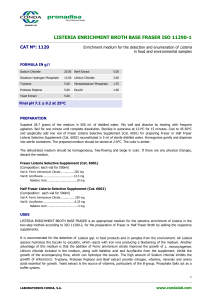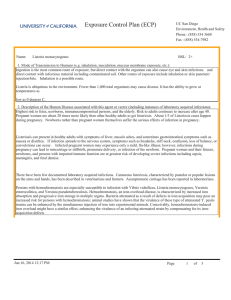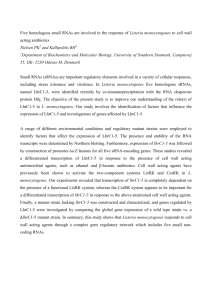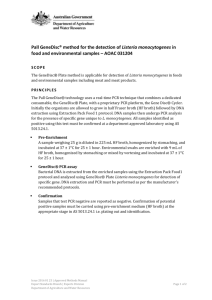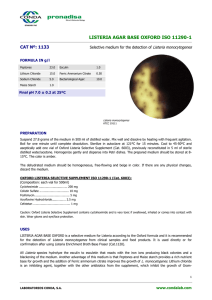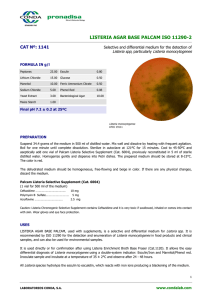LISTERIA FRASER BROTH BASE ISO 11290-1 CAT Nº: 1182 Listeria
advertisement
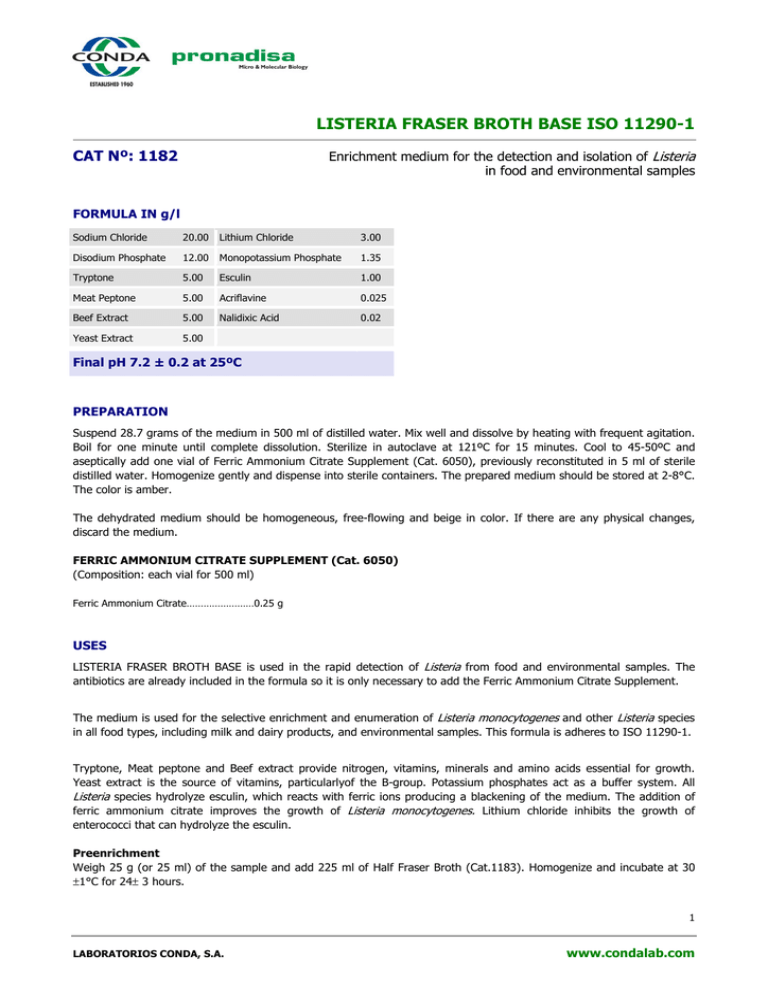
LISTERIA FRASER BROTH BASE ISO 11290-1 CAT Nº: 1182 Enrichment medium for the detection and isolation of Listeria in food and environmental samples FORMULA IN g/l Sodium Chloride 20.00 Lithium Chloride 3.00 Disodium Phosphate 12.00 Monopotassium Phosphate 1.35 Tryptone 5.00 Esculin 1.00 Meat Peptone 5.00 Acriflavine 0.025 Beef Extract 5.00 Nalidixic Acid 0.02 Yeast Extract 5.00 Final pH 7.2 ± 0.2 at 25ºC PREPARATION Suspend 28.7 grams of the medium in 500 ml of distilled water. Mix well and dissolve by heating with frequent agitation. Boil for one minute until complete dissolution. Sterilize in autoclave at 121ºC for 15 minutes. Cool to 45-50ºC and aseptically add one vial of Ferric Ammonium Citrate Supplement (Cat. 6050), previously reconstituted in 5 ml of sterile distilled water. Homogenize gently and dispense into sterile containers. The prepared medium should be stored at 2-8°C. The color is amber. The dehydrated medium should be homogeneous, free-flowing and beige in color. If there are any physical changes, discard the medium. FERRIC AMMONIUM CITRATE SUPPLEMENT (Cat. 6050) (Composition: each vial for 500 ml) Ferric Ammonium Citrate……………………0.25 g USES LISTERIA FRASER BROTH BASE is used in the rapid detection of Listeria from food and environmental samples. The antibiotics are already included in the formula so it is only necessary to add the Ferric Ammonium Citrate Supplement. The medium is used for the selective enrichment and enumeration of Listeria monocytogenes and other Listeria species in all food types, including milk and dairy products, and environmental samples. This formula is adheres to ISO 11290-1. Tryptone, Meat peptone and Beef extract provide nitrogen, vitamins, minerals and amino acids essential for growth. Yeast extract is the source of vitamins, particularlyof the B-group. Potassium phosphates act as a buffer system. All Listeria species hydrolyze esculin, which reacts with ferric ions producing a blackening of the medium. The addition of ferric ammonium citrate improves the growth of Listeria monocytogenes. Lithium chloride inhibits the growth of enterococci that can hydrolyze the esculin. Preenrichment Weigh 25 g (or 25 ml) of the sample and add 225 ml of Half Fraser Broth (Cat.1183). Homogenize and incubate at 30 ±1°C for 24± 3 hours. 1 LABORATORIOS CONDA, S.A. www.condalab.com Selective enrichment Inoculate 0.1 ml of incubated Half Fraser Broth culture into 10 ml of Fraser Broth (Cat.1182). Incubate at 35-37°C for 48 ± 3 hours in aerobic conditions. Isolation The tubes that present a blackening should be subcultured in Listeria Oxford Agar (Cat. 1133) or Listeria Palcam Agar (Cat. 1141), and Listeria Chromogenic Agar (Cat. 1345). The tubes that preserve the original color are considered negative. Identification Identify as Listeria spp. or Listeria monocytogenes using biochemical tests. MICROBIOLOGICAL TEST The following results were obtained from type cultures in the performance of the medium, with the respective supplements added, after incubation at a temperature of 35-37°C in aerobic conditions and observed after 48±3 hours. Microorganisms Listeria monocytogenes ATCC 19111 Enterococcus faecalis ATCC 29212 Growth Esculin Reaction Good + Null - BIBLIOGRAPHY Fraser. J.A and Sperber W.H (1988) McClain D. and Lee W.H (1988) ISO NORMATIVE 11290-1 Horizontal method for the detection and enumeration of Listeria monocytogenes Part 1: Detection Method ISO STORAGE 25ºC Once opened keep powdered medium closed to avoid hydration. 2ºC 2 LABORATORIOS CONDA, S.A. www.condalab.com
